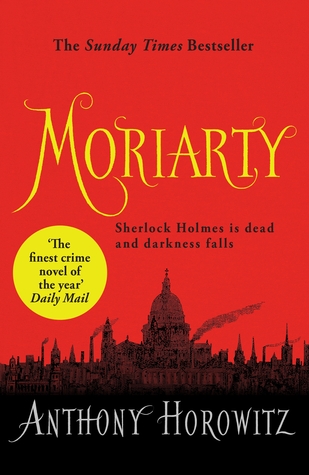 Moriarty by Anthony Horowitz
Moriarty by Anthony HorowitzMy rating: 4 of 5 stars
Sherlock Holmes is dead. His arch-nemesis, Moriarty, is also dead. John Watson has disappeared. So who on Earth are Frederick Chase and Athelney Jones, and why are they the protagonists in a book subtitled 'Sherlock Holmes, #2'?
Well, they are but imitations inspired by the great man himself. Fitting comfortably into the roles of Watson and Holmes, our two protagonists are on the desperate hunt for an international criminal who has brought 1890s London to its knees.
Their association will see them witness the unspeakable and face great horrors. As we see a growing camaraderie between the two characters, the situation of this new London slowly unravels, till we are faced with a most shocking twist.
What can one say about 'Moriarty'? It's hard to live up to the legend of Sherlock Holmes, and his author, Arthur Conan Doyle. But the world's continued fascination with this character has found him and his time reincarnated and adapted many times.
This book attempts to fit itself into the convenient nook of Holmes' hiatus, essentially trying to undo the many continuity errors that crept in when Doyle was forced to resuscitate his star character. Think 'Enterprise' and its attempt to explain the varied features of the Klingons in 'Star Trek', the original series. And just like the television show, the book fails in this enterprise (pun intended).
'Moriarty' is written ably in the style of Doyle, simulating the speech patterns of the 1800s, while carrying an overall sense of mystery. Trouble is, it lacks the flavour of the Sherlockian stories. There is an ease and an air of optimism in the originals, which is completely lacking in this one.
This book is rife with violence, which doesn't seem out of place given modern society's propensity for the same. The author seems to revel in the description of the blood and gore, and he intensifies the cruelties of these criminals. It feels far too contemporary (not that torture was unfamiliar to previous generations) and out of place in story inspired by Sherlock.
It's this element really that makes this book feel non-canonical. Doyle, for sure, wouldn't have stood for it. Even in his darkest and grimmest, it didn't seem bleak. Here it does. One can liken this tale to an American gangster film, not a Sherlock case.
The book also suffers from the need for exposition. It feels almost like the editor was far too concerned that non-Sherlock readers would be left in the dark if the stories of yore weren't summarised. The result is an often sluggish read, where plot and action are interrupted for prolonged periods of time.
The twist in the end may have been shocking, but cynics like me would have seen it coming. It's a pleasant surprise to find I had been right, and that it hadn't detracted from the storytelling. Pieces fell into place, which would have gone astray had any other explanation been given.
Unfortunately, once the revelation takes place, more tiresome exposition enters the picture. Add to that some seriously poor writing (which is unthinkable, given it's Horowitz, but how else do you explain the paragraphs when one character speaks only the obvious), and the big bang ends with a fizzle. The rating here is really 3.5, rather than 4.
'Moriarty', despite its problems, is entertaining and mentally exciting. It has you on the edge often, with some pacey action and several mysteries. You will meet a host of familiar characters, even if not the two characters who you would expect. The game is definitely afoot in this one.
View all my reviews
Comments